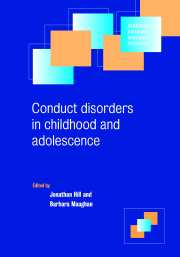Book contents
- Frontmatter
- Contents
- List of contributors
- Preface
- 1 Bad behaviour: an historical perspective on disorders of conduct
- 2 Can the study of ‘normal’ behaviour contribute to an understanding of conduct disorder?
- 3 The development of children's conflict and prosocial behaviour: lessons from research on social understanding and gender
- 4 Neural mechanisms underlying aggressive behaviour
- 5 Biosocial influences on antisocial behaviours in childhood and adolescence
- 6 The epidemiology of disorders of conduct: nosological issues and comorbidity
- 7 Conduct disorder in context
- 8 Genetic influences on conduct disorder
- 9 The role of neuropsychological deficits in conduct disorders
- 10 A reinforcement model of conduct problems in children and adolescents: advances in theory and intervention
- 11 Perceptual and attributional processes in aggression and conduct problems
- 12 Attachment and conduct disorder
- 13 Friends, friendships and conduct disorders
- 14 Continuities and discontinuities of development, with particular emphasis on emotional and cognitive components of disruptive behaviour
- 15 Treatment of conduct disorders
- 16 The prevention of conduct disorder: a review of successful and unsuccessful experiments
- 17 Economic evaluation and conduct disorders
- 18 Antisocial children grown up
- 19 Conduct disorder: future directions. An afterword
- Index
19 - Conduct disorder: future directions. An afterword
Published online by Cambridge University Press: 11 August 2009
- Frontmatter
- Contents
- List of contributors
- Preface
- 1 Bad behaviour: an historical perspective on disorders of conduct
- 2 Can the study of ‘normal’ behaviour contribute to an understanding of conduct disorder?
- 3 The development of children's conflict and prosocial behaviour: lessons from research on social understanding and gender
- 4 Neural mechanisms underlying aggressive behaviour
- 5 Biosocial influences on antisocial behaviours in childhood and adolescence
- 6 The epidemiology of disorders of conduct: nosological issues and comorbidity
- 7 Conduct disorder in context
- 8 Genetic influences on conduct disorder
- 9 The role of neuropsychological deficits in conduct disorders
- 10 A reinforcement model of conduct problems in children and adolescents: advances in theory and intervention
- 11 Perceptual and attributional processes in aggression and conduct problems
- 12 Attachment and conduct disorder
- 13 Friends, friendships and conduct disorders
- 14 Continuities and discontinuities of development, with particular emphasis on emotional and cognitive components of disruptive behaviour
- 15 Treatment of conduct disorders
- 16 The prevention of conduct disorder: a review of successful and unsuccessful experiments
- 17 Economic evaluation and conduct disorders
- 18 Antisocial children grown up
- 19 Conduct disorder: future directions. An afterword
- Index
Summary
Problems involving disruptive behaviour constitute one of the most frequent causes of clinical referral. The preceding chapters of this volume provide a most useful, and interesting, range of perspectives on the issues to be considered with respect to such disorders. In this concluding commentary chapter, some of the key issues that span the different chapters are pulled together. In so doing, research findings are used to draw conclusions on what is known now as well as to highlight research and clinical needs for the future.
Do conduct problems constitute a valid psychiatric disorder?
Over the years, doubts have frequently been raised on this issue (Richters & Cicchetti, 1993). The uncertainties are certainly understandable. The fact that someone behaves in ways that are socially objectionable does not provide a justification for regarding the behaviour as reflecting a mental disorder. What criteria might be used? Possibilities include associated social impairment, accompanying unusual psychological features (such as hyperactivity/inattention or cognitive impairment, or depression) and an adverse outcome in adult life. On all of these criteria, the findings seem to justify a disorder concept (Rutter et al., 1997b, 1998; Maughan & Rutter, chapter 18, this volume). Of course, that is not to argue that any isolated antisocial act justifies the designation of disorder. Obviously, that could not be the case, if only because most people commit such an act at some point during their lifetime (Rutter et al., 1998).
Keywords
- Type
- Chapter
- Information
- Conduct Disorders in Childhood and Adolescence , pp. 553 - 572Publisher: Cambridge University PressPrint publication year: 2000



